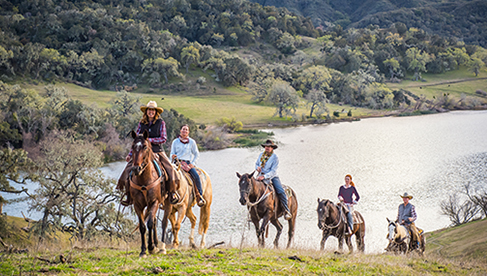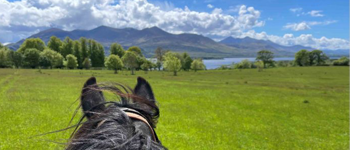Famous Horses in History - Jenny Camp
The incredible story of a three-day eventing superstar in Nazi Germany
By Jill Overacker
1936 - A World in Turmoil
To list Jenny Camp’s accomplishments would not do justice to what this small mare achieved in her lifetime. Though her accomplishments are tremendous on their own, it is the story of Jenny Camp’s brilliant performance during the scandal-ridden 1936 Olympics that makes her one the most famous American horses and one of the best three-day eventers in history.
Uncertainty and unease trickled throughout world in 1936. Hitler and the Nazi party had come into power just three years earlier. German-Jews had been stripped of their rights and by beginning to rebuild the German army, Hitler had violated the Treaty of Versailles. There was great tension in the United States, as there was in countries around the world, as to whether or not they would accept Germany’s Olympic invitation. Many believed that attending would be a sign of support for the Nazi party. Yet, it was successfully disputed that politics should play no role in the Olympics. The 1936 Olympics enjoyed the highest number of participating countries of any Olympics to date.
Amid the tension and talks of cheating on the part of the German hosts, there was one athlete who was not affected by the politics. Jenny Camp was a part Thoroughbred, part Standardbred mare whose success at the Berlin Olympics would make her world famous.

Jenny Camp and Capt. Earl F. Thomspon tackle a difficult cross country obstacle.
Army Beginnings
Jenny Camp was born in 1926 at the U.S. Army Remount Station in Front Royal, Virginia. The Remount Station was built in 1920 as the army took measures to develop a breeding program for the U.S. Calvary to ensure quality war horses for the future. This, combined with the Advanced Equitation School at Fort Riley, led to higher quality horses and riders and, as many Olympic riders of the time were army members, the school became a training ground for Olympic hopefuls.
Born of the great stud Gordon Russell, there were high hopes for Jenny Camp from the very beginning. However, when fully grown and much to the disappointment of her handlers, the mare barely reached a height of 15.3 hands, sported very poor confirmation and had short, choppy gaits. Due to her small stature she was first tried out as a polo pony. When her amazing jumping ability and fearlessness and agility in the air were discovered, she was quickly moved to the three-day eventing team.
On the three-day eventing team, Jenny Camp was paired with Captain Earl F. Thompson. Thompson had graduated from West Point in 1922 and would later go on to earn the Silver Star in WWII. Together, Thompson and Jenny Camp attended the 1932 Olympic Games in Los Angeles where they earned the individual silver medal.
Scandal and Accusations
Going into the 1936 Olympics, the U.S. three-day eventing team was favored to win. Thompson and Jenny Camp were returning medal-winners and other team members, Captain John Williams on Slippery Slim and Captain Carl A. Raguse on Trailolka, were well prepared for the games.
While the dressage portion of the trails went without a hitch, it was the cross country phase that brought speculation and anger from the visiting teams. Jump four would prove to be the downfall forof many horses and riders. The jump was a traditional and seemingly straightforward water combination. It started with a jump into the water and ended with a bending line to a jump out of the water. To save time, riders naturally took the shortest distance between the two fences. However, something was wrong with the footing underneath the water - horse after horse either sunk into the muddy footing or got stuck. By the end of the day, three horses would have to be put down due to injury and only 15 of the 48 horses would successfully manage the combination. These staggering numbers left only three complete teams for the next day’s show jumping phase. Germany was the only team to have all of their riders navigate the combination without issue. The German riders all took a longer route from the first to the second jump, adding seconds to their time but avoiding the disaster that befell many of the other riders and horses.
The American team particularly felt the burn of jump four. Raguse and Trailolka went first. They sunk deep into the muddy pit, the fall almost unseating Raguse as Trailolka struggled out. The brave gelding went on to finish the course but sustained a shoulder injury from the experience. Williams and Slippery Slim would not be so lucky. When Slippery Slim landed on the soft earth his front leg got stuck deep in the mud and broke. He was pulled from the water and, his injuries too severe, euthanized. The U.S. chance for a team medal was gone.
Having a later start time, Thompson and Jenny Camp were one of the last few to head out on the cross country course. This proved to be more of an advantage than they knew at the time. The technology of the day did not allow for communication between the riders who were already on course and those that had yet to come. Most of the riders that day went out uniformed of the danger ahead. However, as Thompson and Jenny Camp were one of the last pairs to go, the rumors of jump four reached them in time.
Thompson chose to take the longer, safer course and he and Jenny Camp illuminated the course. Much, we can be sure, to the dismay of the German officials. After his rousing cross country trip, Thompson learned of Slippery Slim’s fate and how Trailolka would not be competing in the show jumping phase due to his injured shoulder.
The Heart of a Champion
Though their chance for a team medal had vanished, Thompson decided he and Jenny Camp would still tackle the show jumping course the next day. They went clean in two stunning rounds and from Berlin took home their second individual silver medal. Jenny Camp was able, despite the incredible barriers in her way, to achieve a feat few horses have ever done – win back-to-back three-day eventing medals.
Jenny Camp’s story and her amazing accomplishments make her one of America’s most famous horses and, to this day, one of the world’s most celebrated three-day eventers. In Olympic history, only three horses have been able to win consecutive medals in the three-day event. The feat was first accomplished by Lt. Charles F. Pahud de Mortanges who aboard Marcroix brought home gold medals from both the 1928 and 1932 Olympics. Mark Todd aboard Charisma also accomplished the feat in 1984 and 1988.
Jenny Camp never had a chance to continue her streak; with the outbreak of World War II the 1940 Olympic Games in Tokyo were cancelled (the 1944 games would also be cancelled). Jenny Camp was retired after her spectacular Olympic performance in the place where she started – the U.S. Army Remount Station in Royal Front, Virginia.
Stay connected with Equitrekking online by following us on Twitter and Facebook.
References:
Devereux, Frederick L. Famous American Horses: 21 Steeplechasers, Trotters, Cowponies, Hunters, Flat Racers, Show Horses, and Battle Mounts That Have Made History. Old Greenwich, CT: Devin-Adair, 1975. Print.
Miller, David. Athens to Athens: the Official History of the Olympic Games and the IOC, 1896-2004. Edinburgh: Mainstream, 2003. Print.
Reuter, Coree. The Chronicle of the Horse. Publication. 12 Jan. 2011. Web. 28 June 2011. <http://www.chronofhorse.com/article/legendary-horses-jenny-camp>.
"United States Eventing Association - Hall of Fame." USEA - United States Eventing Association (Eventing, Combined Training, Three Day Event, Horse Triathlon, Equestrian Sport). USEA, 2005. Web. 28 June 2011. <http://useventing.com/hof/index.php?id=4>.




